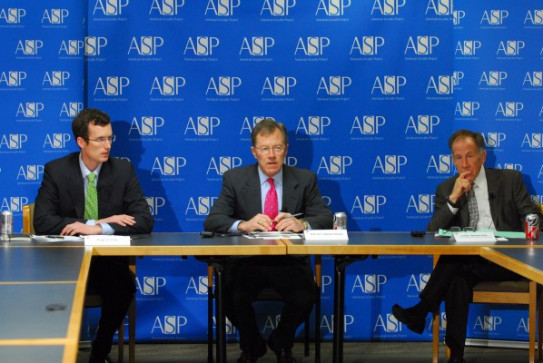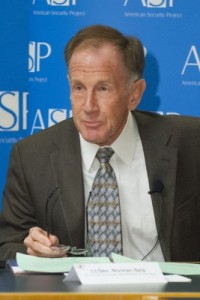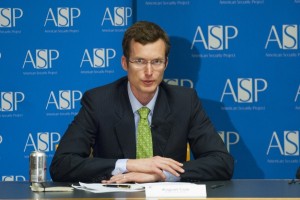
Event Recap: The Battle on the Final Frontier – A Discussion of National Security and Space
Podcast: Play in new window | Download
Subscribe: Apple Podcasts | RSS
![]() The last time that the mass media looked at national security and space, we were in a very different time. The United States was embroiled in the Cold War and the danger of nuclear annihilation was at the forefront of most people’s minds.
The last time that the mass media looked at national security and space, we were in a very different time. The United States was embroiled in the Cold War and the danger of nuclear annihilation was at the forefront of most people’s minds.
Although we have advanced from that point, technological developments in space beg the question: how is our current space technology tied to our national security needs? How has our reliance on Russian technology made us vulnerable? How can we enhance our national security and support American research and investment?
The American Security Project is working to help start this dialogue in order to help inform the public and create a consensus in regards to the issue of U.S. access in space.
On Tuesday April 1st, ASP hosted a kick-off event featuring Lt. General Norman Seip, former Commander of the 12th Air Force (Air Forces Southern), at Davis-Monthan Air Force Base in Arizona and adjunct fellow at ASP, along with August Cole, a former Wall Street Journal reporter that writes about American competitiveness, military and intelligence spending and the defense industry. He is also an adjunct fellow at ASP that is helping lead our efforts to tackle the issue at hand.
Check out August’s new report here: National Security and America’s Space Challenge
In Lt. Gen Seip’s experience as a Commander of an Air Operation Center (AOC), he has observed that space has taken a forefront at all of the AOCs he has visited. He noted that space has become a priority in the eyes of other AOC Commanders, and that it is becoming a contested and competitive environment that the United States should be concerned with.
August mentioned the fact that the “front-burner” national security issues are what usually takes priority in Washington, and that it is easy to overlook space issues. It is not really part of our daily ritual to look up and imagine the types of operations are taking place in space, nor do we think about the critical components that allow those operations to take place.
So, what is the tie to national security you might say? For the past 12 or 15 years, the U.S. has had an unfair advantage when it comes to space. However, the Chinese have recently gotten involved. They are now operating in space and working on new missions that Lt. Gen Seip believes have been successful in “cluddering up” space in a way that could potentially impact the U.S.’s ability to conduct necessary military operations. Not only could this impact our business as usual in space, but he said that it could also take away our asymmetrical advantage. Another point he made is that non-state actors do not necessarily have to be in space to threaten our asymmetrical advantage, but could also affect our operations by carrying out attacks within the cyber-realm.
In Lt. General Seip’s words, national security is about options: the right options, along with choices: good choices. In regards to military access to space, when the U.S. has to rely on Russia for a “critical element” , such as the RD-180, the main engine used in one of the Pentagon’s key space launch vehicles, it is not a very good option, nor is it a very good choice to have. If the Russians decided to take away that component, then according to Lt. General Seip, the United States’ space operations would be severely impacted.
It does not take much digging within the news to look at our current U.S/Russian relations. As the situation in the Crimean Peninsula continues to unfold, along with the exchange of economic sanctions on one another, does it not raise concern that the United States relies on Russia to supply critical technology and hardware used to launch our military satellites into space? Lt. General Seip also went on to say that Russia is currently working with China, alongside other “less than neighborly nations”, to develop new satellite technologies that could degrade or destroy those very systems.
“In the importance of space-based intelligence gathering, we know that it’s crucial, not just in the tactical context, but it also provides information that shapes our strategic understanding of the world we live in; that means advanced notice of troop movements, or it means intercepting military communications, which is undeniably important.” – August Cole
With that being said, General Seip is not convinced that Putin is unaware that the same U.S. satellites Russia helped launch into space are now doing just that: monitoring troop movements and gathering intelligence, not to mention the fact that the U.S. is sharing this information with our European allies, the same allies that along with the United States just recently decided to suspend Russia from the G8 for its actions.
One of the ways in which August Cole mentioned that he looks at American competitiveness is not only analyzing what makes us strong, but what makes us weak. The United States needs to look at its industrial base and assess whether or not enough is being done in both the military and civilian sectors around space launch as far as research and development goes. Procurement of space satellites is also a factor that comes into play and must be kept in mind, even in the midst of smaller defense budgets.
“Clearly there is a vital need that is developing and it’s something that policy-makers need to be more attuned to.” – Cole
All in all, both Lt. Gen Seip and August Cole agree that if we do not change our current course, we will continue to grow more and more vulnerable of losing our asymmetric advantages of military space operations.
Interested in what else Lt. Gen Seip and August had to say about national security and space? Check out the full video and audio of our event below. Also, check out www.nationalsecurityandspace.org to keep up with what the American Security Project is saying about this issue.
Follow ASP on twitter @amsecproject and engage with us using #ASPSpace
Follow August Cole on twitter @august_cole
Nathan Daniels is a research assistant & intern at the American Security Project. He is senior at the University of Tennessee at Martin pursuing a B.A. in Political Science with a concentration in international security studies. Follow him on twitter: @nathanldaniels







